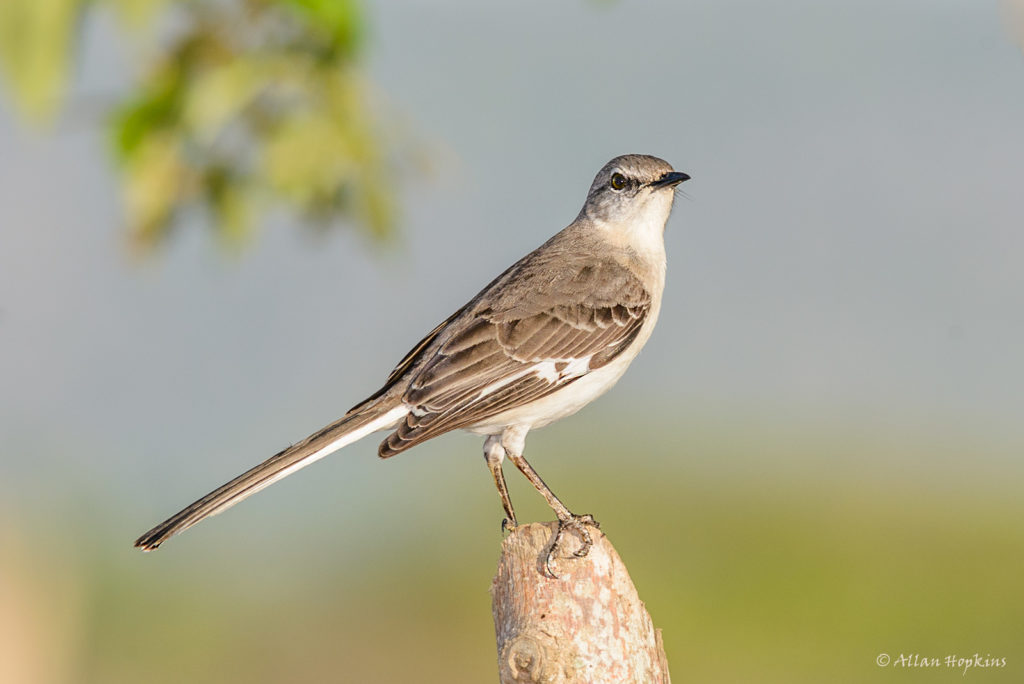Almanac: Thrill Of A Mockingbird

Northern mockingbird (Mimus polyglottos). Photo: Creative Commons
The sun had set, but it was still light out as a friend and I walked along a back road in North Hadley, the air filled with a heady incense rising from recently-harvested tobacco fields. The quiet of the evening was suddenly broken by the melodious, remarkable singing of a mockingbird, perched on the top-most spire of a tall spruce tree. We stopped to listen as this small bird sang its never-repeating tumble of sounds and songs with such abandon. It was a treat because I never hear mockingbirds in my yard near downtown Amherst. Catbirds visit sometimes, and they can sing with a similar, although less complex, variety of sounds. But mockingbirds prefer the more open terrain of places like the Hadley flats.
Mockingbirds are supposed to be able to over-winter in southern New England, but I’ve never heard one around here in winter. (Have you? If so, post a comment below…I’m curious.) According to some sources, mockingbirds in the northern part of their range do migrate south, at least to some extent, so this bird may have been pausing for a song break on its journey to more balmy climes.
The musical abilities of mockingbirds are phenomenal. One researcher classified 400 distinct vocalizations among 15 mockingbirds he studied over the course of two years. These vocalizations included both mimicry of a wide range of sounds, natural and human-made, as well as improvisations on previously-learned songs. Mockingbirds commonly, and accurately, imitate cardinals, tufted titmice, house sparrows, wood thrushes, flickers, and blue jays. They can also mimic sounds made by cats, dogs, frogs, crickets, and artificial sounds such as squeaky wheels and car alarms. Not only are these sounds memorized and retained for years, the birds then combine the sounds in infinitely variable ways to produce incredibly complex songs lasting up to 20 minutes each.
Mockingbirds continue to expand the size and diversity of their repertoires as they age, which puts them at the extreme end of a spectrum ranging from “close-ended” song birds, which only learn a few songs early in their lives and never vary them afterwards, to very “open-ended” birds which memorize, rehearse, and improvise on songs their entire lives.
Both male and female mockingbirds sing, although females (which look identical to males) tend to sing more quietly. The males are believed to sing both to attract females during the spring breeding season and to establish their territories, which they will defend aggressively against other males, other birds, and other animals, including humans.
I wonder, though, if sometimes mockingbirds just sing for the sheer joy of it. The bird we listened to, for example, was singing as darkness fell, out of breeding season, and possibly far out of any territory it might have established farther north. Yet there it was, singing away from the tallest point around with no other mockingbirds—or even other birds—around for it to impress. I don’t think it was singing for us, either, but it harkens to a famous line from a famous book—the one said by Miss Maudie to Scout, who had asked what her father, Atticus, meant when he told her it was a sin to kill a mockingbird.
“Mockingbirds don’t do one thing but make music for us to enjoy. They don’t eat up people’s gardens, don’t nest in corncribs, they don’t do one thing but sing their hearts out for us. That’s why it’s a sin to kill a mockingbird.”
Almanac is a regular Indy column of observations, musings, and occasional harangues related to the woods, waters, mountains, and skies of the Pioneer Valley. Please feel free to comment on posts and add your own experiences or observations.

Amen.